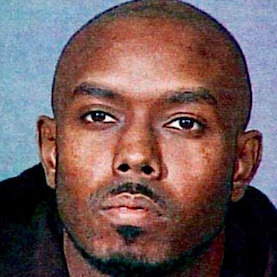 Derrick Redd
The crime was discovered when Delain’s boyfriend, 35-year-old Derrick Redd, and her mother came to the apartment because Delain had not responded to calls or text messages.
Redd agreed to go to the police station for questioning. Although police later said that Redd made several statements that were suspicious—“I either avoid the problem or I eliminate it” and “we argued about an abortion”—he was released without being charged after 27 hours.
However, on November 17, he was arrested and charged with murder, causing an abortion, and criminal possession of a weapon.
In October 2011, Redd went to trial in Queens County Supreme Court. The prosecution’s primary evidence came from Jinette Gerve, who lived in the apartment above the one where Delain was killed. Gerve said that early in the morning of the day Delain was found dead, she heard Delain shouting Redd’s first name and “stop,” “no,” and “don’t do that.”
Gerve admitted that on the day the murder was discovered, she told police that she heard nothing. She further admitted that the second time police spoke to her, she again denied hearing anything. It was not until about two weeks later that Gerve gave a statement saying she had heard Delain calling Redd’s name. She denied during cross-examination that she had been provided any benefits in return for her testimony.
However, after Gerve finished testifying, the prosecution turned over records showing that in fact she had been paid $4,500 to relocate and that the prosecution was helping her with an immigration matter. Redd’s defense attorney agreed to present the evidence in statement to the jury, but did not reopen cross-examination to confront Gerve directly about her denial of receiving any benefits.
The prosecution presented records that allegedly showed that Redd’s cell phone had pinged off a cell tower a block from Delain’s apartment in the early morning hours of October 25, 2008. At the time, Redd was living about three miles away.
The prosecution also presented evidence of Redd’s statements to police during his initial interrogation, and argued that those statements indicated he committed the murder because Delain had not gotten an abortion. In addition, the jury heard evidence that when arrested, Redd had three small cuts on his hand. The prosecution contended that this was proof that he had stabbed her and cut himself when the knife struck a bone in Delain’s body, causing his hand, which was bloody, to slide forward and cut him.
A medical examiner testified that she “found nothing” in the autopsy that would be consistent with the time of death of 6 a.m.—the time that Gerve said she heard Delain screaming.
On November 3, 2011, the jury convicted Redd of second-degree murder, second-degree abortion, and criminal possession of a weapon. He was sentenced to 25 years to life in prison.
In July 2016, the Appellate Division of the New York Supreme Court reversed the convictions and ordered a new trial. The appeals court found that the prosecutor, Eugene Reibstein, had engaged in egregious prosecutorial misconduct.
“During opening statements as well as on summation, the prosecutor repeatedly engaged in improper conduct, including misstating the evidence, vouching for the credibility of witnesses with regard to significant aspects of the (prosecution’s) case, calling for speculation by the jury, seeking to inflame the jury and arouse its sympathy, and improperly denigrating the defense,” the appeals court said.
Reibstein, the court said, had “flatly misstated” the medical examiner’s testimony, quoting her to the jury as saying, “I found nothing in my autopsy that would be inconsistent with the time of death of 6 a.m.” And then, Reibstein went on to say, “Can we get more clear than this, ladies and gentlemen?”
Reibstein told the jury that Redd suffered the cuts on his hands when he stabbed Delain more than 20 times. “During this repeated stabbing, you may get yourself a little cut there, a little cut there and a little cut there,” particularly “(i)f the blade stabs something hard, like a baby.”
The court said, “Not only was the remark needlessly inflammatory, it also improperly cast the prosecutor as an unsworn witness in his own case.”
The defense attorney repeatedly objected to Reibstein’s comments, the court noted. Some of the objections were overruled and in a few instances, the judge cautioned Reibstein about making improper comments. In some instances, the judge didn’t rule on defense objections at all.
At one point, the judge warned Reibstein that “if you keep inflaming the jury, you will come to regret it.” Reibstein nevertheless continued.
“Soon thereafter,” the appeals court said, Reibstein “continued his string of inflammatory remarks by stating, ‘It happens, when you can’t get somebody to (get) an abortion…you have to take care of them the last day yourself.”
Redd went to trial a second time in March 2018 with a new defense attorney, Wynton Sharpe, who presented text messages between Delain and Redd from June 2008—six months before the crime. In one message, Delain said she was willing to perform sex acts for money so that she could pay for an abortion. In another, Redd said that he would go to court to seek custody of the child after he was born.
Sharpe also cross-examined Gerve with the records showing she had implicated Redd only after she received numerous benefits from the prosecution.
Sharpe also introduced evidence showing that there were other cell phone towers further away from Delain’s apartment where Redd’s cell phone was picked up—not a tower just a block away.
On April 4, 2018, the jury acquitted Redd and he was released.
In May 2019, Redd filed a federal civil rights lawsuit seeking damages from the city of New York. In October 2019, he filed a claim for compensation in the New York Court of Claims. He settled the claim for $30,000 in 2023.
In January 2023, the lawsuit was dismissed. His attorneys filed a notice of appeal. The appeal was rejected.
– Maurice Possley
|